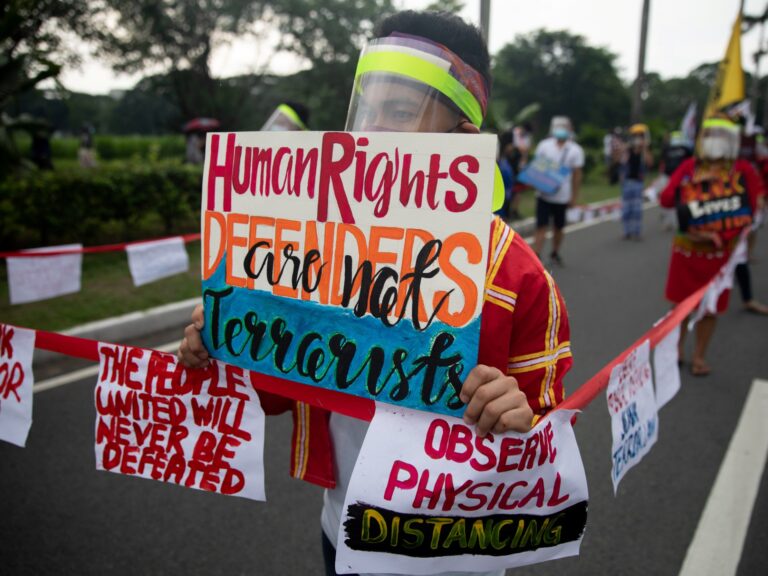Baguio, Philippines – In an unlit bathroom, Windel Bolinget gently tips a bucket of water over his head, careful to minimize the sound of the splash on the tiled floor.
A well-known activist leader in the mountainous Cordillera region of the northern Philippines, the 49-year-old spends most of his days between several secret shelters.
Bolinget tries to remain invisible indoors, only coming out if absolutely necessary and avoiding making any noise that might attract attention.
“I have normal routines with extraordinary effort,” he said.
On the rare occasions he spends with his family in his own home, he follows the same protocol.
At night, whether Bolinget is there or not, his wife and four children wake up as soon as one of their six dogs barks. They monitor security cameras and take to the streets, worried that armed men have come for him. Neighboring households do the same, knowing that the man they have considered their friend for decades has been labeled a “terrorist” by the Philippine government, which wants him behind bars.
“We need to be able to sense danger, have emergency contacts at hand and know if we are being followed in a public place,” he said.
Bolinget is president of the Cordillera Peoples Alliance (CPA), an activist coalition of indigenous groups. He and three other CPA leaders, Jennifer Awingan-Taggaoa, Steve Tauli and Sarah Abellon-Alikes, were designated “terrorists” by the Anti-Terrorism Council (ATC) on July 10, 2023.
Citing “probable cause” of participation in “organized violence,” the ATC, led by executive officials, claims that the CPA and the four individuals are part of the country’s armed group. long-standing communist armed rebellion.
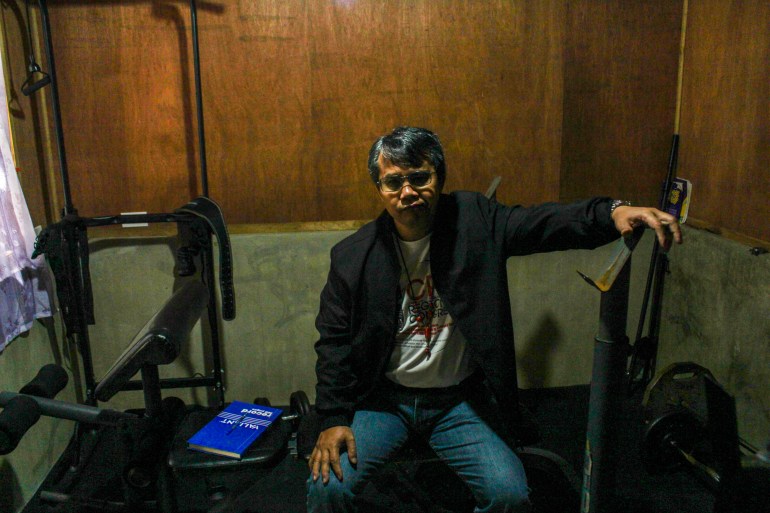
Under the Anti-Terrorism Act (ATL) of 2020, authorities can arrest people identified as “terrorists” without a warrant, restrict travel, freeze assets, carry out surveillance, and issue new court orders restricting their travel without explaining why. Some individuals previously described as “terrorists,” communists or enemies of the state were later found dead. Some 89 extrajudicial killings of activists have taken place since June 2022, when Ferdinand Marcos Jr became president.
According to the human rights association Karapatan, 51 people are currently designated as “terrorists”.
The designation marks a step forward from the more common designation red marking, where activists are linked to armed rebellion in an attempt to justify a crackdown. In the past, the four CPA leaders have been criticized in cases related to their alleged involvement with the rebels. All these measures, including the “shoot to kill” order against Bolinget, were rejected by the court.
Critics have described the ATL as the second coming of martial law in the Philippines.
For the past nine months, CPA leaders have lived in relative isolation, outside of court hearings to challenge the ATC’s decision.
“We want to prove the facts and question the basis of the designation,” said Baguio City Councilor Jose Molintas, lawyer for the four alleged “terrorists.”
Karapatan’s Cristina Palabay said the law “institutionalizes the ATC’s mandate to act as judge and party in implementing its draconian crackdown.” Not only does this threaten and harass activists, but it also puts their lives in danger.”
Life in terror
On social networksthe Bolinget and Taggaoa families were described as terrorists in 2020.
Photos of their children, some under the age of 18, have been portrayed as descendants of “terrorists” by trolls and even law enforcement. Taggaoa’s daughter Kara, a labor rights activist in Manila, was also arrested in 2022 for a theft that allegedly took place during a protest.
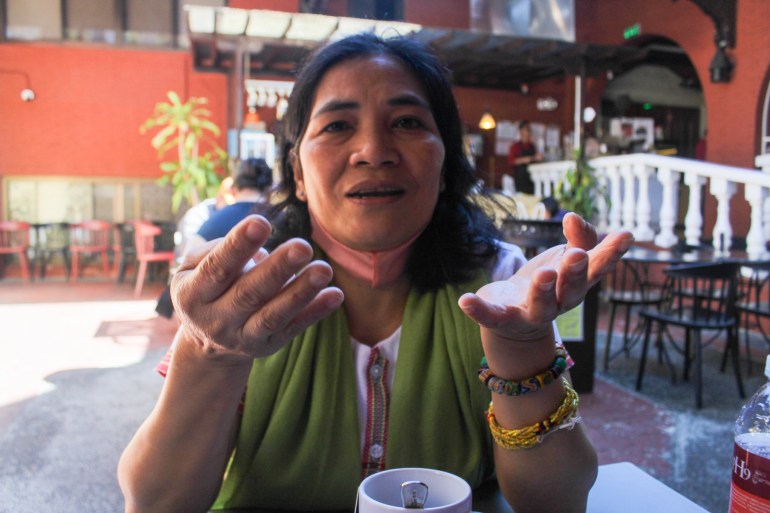
Joel Egco, spokesman for the National Task Force to End Local Communist Armed Conflict, issued a warning to dissidents earlier this year: “Before you accuse yourself (of terrorism), surrender now! »
In such an atmosphere, CPA leaders live in constant fear for the safety of their families. Bolinget says some friends and relatives have severed ties, fearing that associating with them could be considered criminal.
“I am an enemy of the state, an open target. The state wants to isolate me from my family, it’s easier for them that way,” he said.
Bolinget led one of 37 Supreme Court petitions against the ATL in 2020, flagging potential human rights violations.
“All our fears came true and I became a living testimony that to be considered a terrorist is to be treated worse than a criminal,” he said.
This designation also affects their health. Bolinget and Taggaoa suffer from more frequent stomach problems and have to convince their doctors to see them at inopportune times.
Taggaoa feels “so sick all the time. The doctors said it was due to stress.
Bolinget attributes his poor health to lack of sleep. “Half of your brain is always awake and alert. I’m always nervous, like my temper is going to boil over at any moment,” he said.
Constant alarm
When Taggaoa was arrested in January 2023, she wasn’t worried. She, Bolinget and five others had been charged with rebellion after allegedly taking part in an armed raid.
“I immediately knew it was false and I could prove it in court,” she told Al Jazeera. The case was dropped in May. But a few months later, she discovered she had been nominated by the ATC when the decision was published in a national newspaper.
Taggaoa spent the next four months moving from shelter to shelter and reminding her family to lock all the doors and stay vigilant.
In January, Marcos Jr said he wanted the Philippines to quickly move out of the “grey list” of the Financial Action Task Force (FATF), a global money laundering and terrorism financing watchdog.
To do this, Marcos announced “accelerated action plans to combat money laundering and terrorist financing, and to prosecute violators.”
Living without access to personal and professional funds was a particular challenge as Taggaoa had to abandon his small general store.
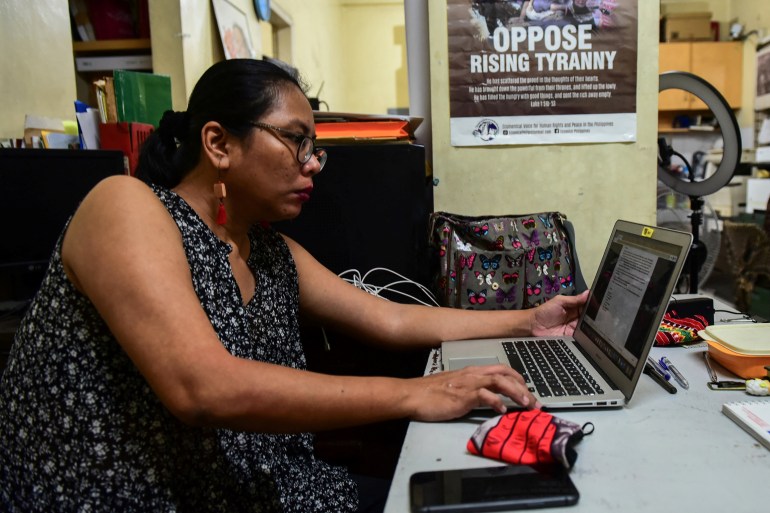
The accounts of Taggaoa’s husband, a university professor, were also frozen, so he was unable to meet his car loan payments and had to make special arrangements to receive his salary.
Taggaoa believes that this designation is a new tactic, designed to neutralize opponents after other methods have failed.
“They harass you and push you to side with the government. And if you refuse, they will end up calling you a terrorist,” Taggaoa said.
Throughout 2022, military officers attempted to persuade Taggaoa and his relatives to “cooperate” with them.
On her way home from school, her teenage nephew was even approached by soldiers who, she says, pressured him to steal Taggaoa’s files and USB sticks.
Confusion in the courtroom
Legal challenges have also proven difficult.
When the four appealed directly to the ATC to have the designation removed in August 2023, it was immediately denied without a hearing.
“ATC relies solely on unverified intelligence reports. He just accepts them as true and immediately issues designations, which is a violation of due process,” said Molintas, legal advisor to the four. As he spoke to Al Jazeera, posters of him were plastered across the city’s streets, also calling him a “terrorist.”
Justice Department spokesperson attorney Mico Clavano defended the designation process, saying the ATL authorizes it as a “purely executive act” without judicial intervention.
This is where the danger lies, according to Molintas.
“A person is supposed to be presumed innocent, not guilty, before appearing in court,” he said. “A terrorism charge is different from simple red-tagging because it deprives the individual of the right to due process. »
After the appeal was rejected, Molintas turned his attention in November 2023 to the cancellation of the ATL and the designation to the Regional Trial Court (RTC). Since then, the lawyer has accused the government of trying at every turn to derail his efforts.
During three RTC hearings, armed men dressed in civilian clothes were seen inside the court. They were later identified as active duty soldiers.
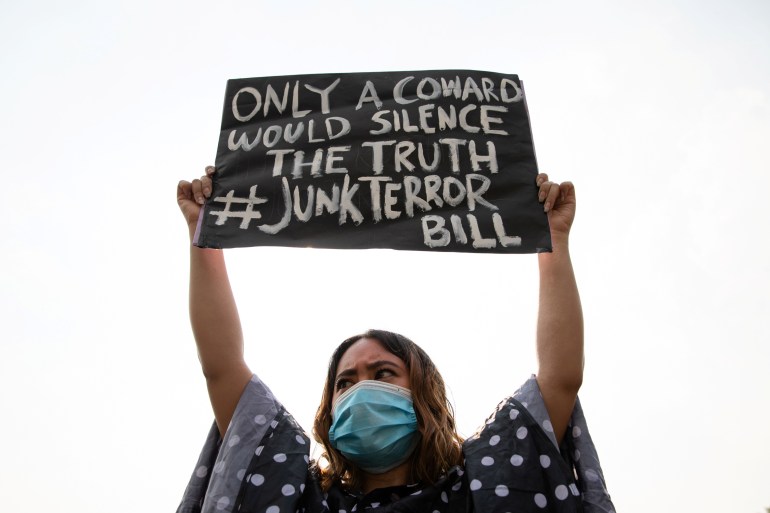
The Office of the Solicitor General (OSG) says that even if the court ruled in favor of the four, they would still be considered “terrorists” outside of Cordillera because the RTC presides “in only one part of the country.”
Some lawyers disagree.
“The OSG is wrong,” said Ephraim Cortez of the National People’s Lawyers Union. He asserts that the RTC challenge applies nationally because it invokes constitutional powers to determine “serious abuses” in government decisions.
The RTC has scheduled another round of hearings for April 25.
Meanwhile, Taggaoa rarely leaves the house unless absolutely necessary. Her community research and her role as a parent have been seriously compromised and she fears the same fate for her children.
“I think my life will be like this until our case is solved,” she said, but even though the “terrorist label” took a toll on her family, she had a unexpected benefit.
“We protect each other and it has brought us closer,” she said.


